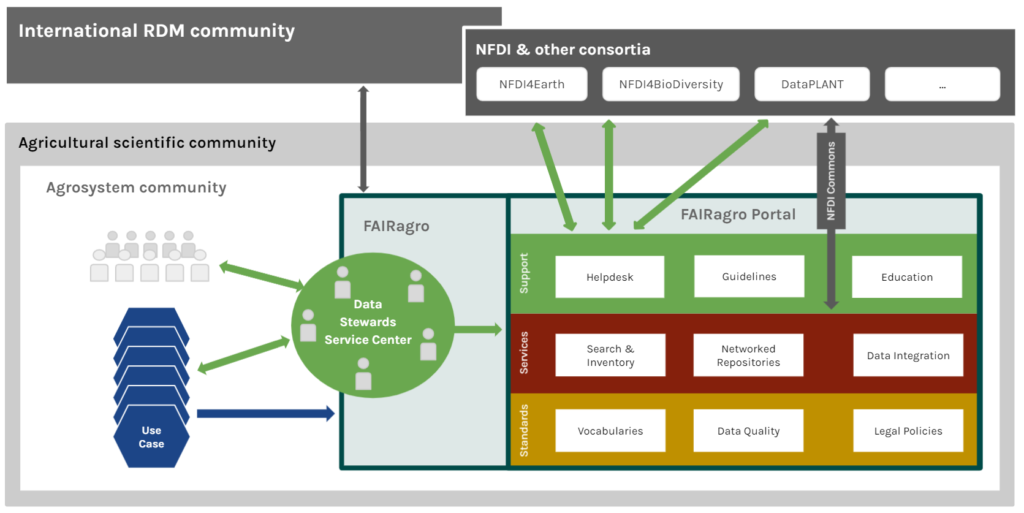FAIRagro is open and community driven and already does and will continously identify community needs and participate it in order to develop services and products really needed und used. With this overarching aim, we will establish an interoperable and scalable RDI by connecting available repositories to make research data FAIR. We will facilitate combined data analyses and establish a multilevel support system by setting up a Data Steward Service Center. We will provide guidelines and information material, and focus on knowledge transfer for agrosystem researchers. FAIRagro will address quality and legal security challenges beyond the FAIR principles. Our 10 objectives will guide us on this way.

Our services and products will be accomplished by close collaboration with other NFDI consortia and the inter/national community. We will advance NFDI ambitions with expertise and approaches for legal data security challenges, stakeholder involvement and RDIs for highly interdisciplinary and multi-scale research in a field of high societal relevance.
Our 10 objectives

1. Cultural change
Enabling researchers, students, and infrastructure providers to achieve an open and sustainable research data life cycle and foster a cultural change towards FAIR and collaborative RDM.

2. Solutions for the community
Continuously identify RDM challenges in the agrosystem community and provide solutions via continuously developed RDM services to meet the needs of our community and develop FAIRagro to NFDI4Agri.

3. Portal as a central hub
Establish the FAIRagro Portal as the central access point for RDM in the agrosystem sciences to enable knowledge exchange, technology transfer and participatory processes to promote dialogue with our community.

4. Findability and exchange
Improve the findability of published research data and existing data repositories and provide discipline-specific interoperable infrastructures to enable standardised data exchange.

5. Orientation for researchers
Establish a set of standards, guidelines and best-practices as guidance for researchers to promote and enable FAIR RDM and infrastructure providers.

6. Quality assurance
Ensure research data quality via domain-specific measures of quality control and establish a quality feedback and curation system to facilitate the reuse of research data by agricultural scientists.

7. Legal security
Provide legal certainty to infrastructure providers, data providers and users for the publication and reuse of sensitive data.

8. Reproducibility
Enable reproducible research results, the deployment and publishing of models and data analysis workflows, and contribute to the reproducibility of research results.

9. Interoperability
Ensure the interoperability of an agrosystem research data infrastructure within related domains in the agricultural sciences and within NFDI as well as with the overarching NFDI and international initiatives.

10. Internationalisation
Contribute to and lead European and international developments of RDI in agrosystem and agricultural research.

